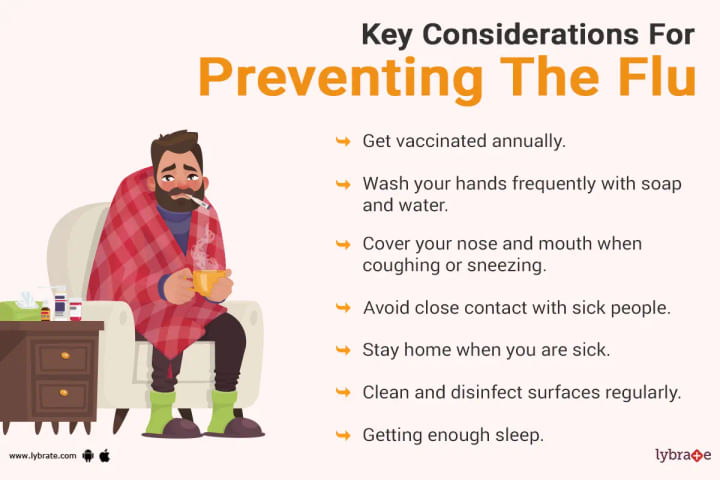Important Things To Keep In Mind For Prevention From Flu!
Do you often find yourself suffering from a blocked nose and an aching throat when the weather changes? Or have you ever missed an important day at the office owing to a bad headache and fever? These may appear to be minor flu symptoms to some people, but they can be problematic for many others and an impediment to their daily lives.
Influenza, which is commonly referred to as the flu, is basically a respiratory infection that may affect any person, regardless of their age, gender, or health condition. It goes without saying that influenza affects millions of people living in different countries and regions across the world every year, without fail. Influenza can usually cause symptoms that range from mild to severe.
Some of the most commonly reported flu symptoms are:
- Body aches
- Fever
- Coughing
- Sore throat
- Runny nose
- Fatigue
In most cases, the given symptoms improve within a week or so. However, some people may experience certain complications that require further medical treatment. Especially for older adults, whose immune systems might not be as strong, the flu can pose a serious threat. This means that older adults are usually at a higher risk of having to face complications, such as pneumonia, following an influenza infection.
Up to 85 percent of people who die from the flu each year are 65 years of age or older. If you are also in this age group, it becomes essential for you to take extra care of yourself in order to keep away from influenza viruses. The following are some great and quite effective natural ways to keep yourself safe during the dangerous flu season:
Avoid Exposing Yourself to Large Crowds
Avoiding large crowds can be quite difficult for most of us, but at the same time, it is equally crucial, as it was during the COVID-19 pandemic. If it is possible for you to limit contact with the people around you during the season of influenza, you can greatly reduce your risk of getting infected with flu viruses. Just like in the case of the COVID-19 virus, by avoiding contact with other people as much as possible, you can help reduce your risk of becoming infected with influenza viruses.
The flu virus is known to spread quickly in areas where people are in close proximity to one another, such as schools, workplaces, nursing homes, and assisted-living facilities. If you think that you have a weaker immune system, it is strictly advised that you put on a face mask whenever you have to be in a public place during flu season in order to protect yourself from catching the virus.
It is important to protect yourself by avoiding contact with people who you know are already sick. If it is possible, you must distance yourself from an individual who is sneezing, coughing, or, for that matter, has other symptoms of a cold or virus.
Never Forget to Wash (or Disinfect) Your Hands
Wash your hands regularly, and we mean really regularly. The flu virus can survive on hard surfaces for long periods of time, so it is important to get into the habit of washing your hands often.
Thoroughly washing your hands is especially important before you prepare any food items or eat. Apart from that, you should also never forget to thoroughly wash or disinfect your hands after you use the restroom.
Furthermore, you must already know that hand sanitizer is an easy and quick way to disinfect your hands when there is no availability of water, soap, or hand wash. So, you should always try to keep a good hand sanitizer with you and keep using it throughout the day as needed. A hand sanitizer should be used especially after coming into contact with surfaces that are commonly touched by everyone, such as light switches, furniture, counters, doorknobs, etc.
Washing your hands (regularly) is important, but you should also be careful not to touch your mouth, nose, or eyes. The influenza virus is not only capable of traveling through the air; in fact, it can also enter a person's body when infected hands touch their face.
Moreover, if you are sick, it is important for you to take certain steps in order to prevent the spread of the virus. In addition to regularly washing your hands and not touching your face, you should also stay home from work or school if you feel under the weather.
Get Your Flu Shots Every Year
One of the best and most popular ways to protect oneself against the seasonal influenza is to get a flu vaccination every year. The predominant circulating flu virus changes annually, so it is important to get an updated vaccination each year.
You must keep in mind that it generally takes two weeks or so for the vaccine to become effective. However, if you do happen to catch the flu even after getting vaccinated, the shot may help reduce the severity and length of your illness.
People aged 65 and older should get the annual flu shot (or vaccination) as soon as it becomes available, by late October at the latest. This is because people in the age group of 65 and older are usually at a higher risk of developing certain complications from the flu virus. Talk to your doctor about getting a high-dose or adjuvant vaccine, which is specifically designed for people aged 65 and older.
Conclusion
The flu, or influenza, is basically a virus that may infect the throat, nose, and lungs. It can vary from a mild illness to a life-threatening infection. Symptoms of the flu include muscle aches, fever, runny nose, sore throat, headaches, and fatigue. It can be more serious for children, older adults, and those with certain medical conditions.
If you are experiencing the given symptoms, you must seek medical help or speak with your doctor right away. Furthermore, we just hope that you find this article interesting, informative, and useful in the future. Thanks for reading!



+1.svg)
